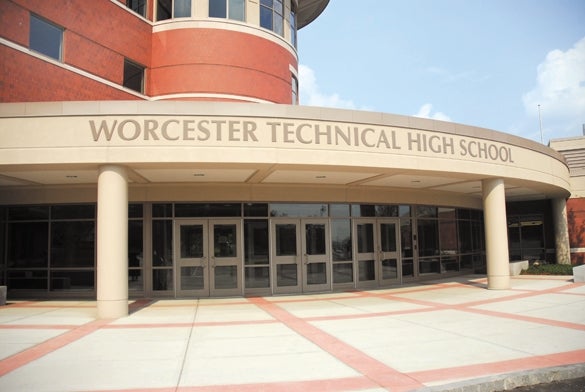Regulations adopted Tuesday and set to affect applicants for the 2022-2023 school year will require vocational-technical schools to develop their own admissions policies “that promote equitable access”, removing the requirement that grades, attendance, discipline records and counselor recommendations be used as admissions criteria.
Elementary and Secondary Education Commissioner Jeff Riley said the new regulations will bring Massachusetts more in line with other states, give state officials authority to intervene in cases of non-compliance and update a process that “has not been touched” for 20 years.
“Last year, we gave the vocational schools an opportunity to make changes, and we didn’t feel that they had done a substantial enough job in doing that, and so today we’re asking for the ability to intervene, if necessary, to make sure that children get a fair opportunity,” Riley said before the Board of Elementary and Secondary Education voted to approve the new regulations.
He said his department plans “to be very forceful” in cases of non-compliance and could in those cases “order changes to admission policies that may include requiring a lottery.”
A February analysis of waitlist data shows that demand for vocational education across Massachusetts exceeds available seats, with 1.75 completed student applications for every program seat. In some communities, according to the analysis, the number of applications rose to twice as high as available seats.
That review also identified disparities in the number of admissions offers made for different student subgroups, finding that, “Students of color, students identified as economically-disadvantaged, students with disabilities, English Learners, and students [whose] first language is not English received fewer offers of admission.”
A group called the Vocational Education Justice Coalition had urged the state to move toward a lottery-based admissions system, and ahead of the vote called out what coalition members described as shortcomings around access and equity in the new approach.
Lunenburg Sen. John Cronin also asked for changes, using the public comment period at Tuesday’s meeting to flag three questions he wanted answered: what admissions outcomes need to be fixed, which are equitable and fair, and which necessitate an admissions lottery.
“I fear that those answers to those questions vary district to district, board member to board member, commissioner to commissioner, school administrator to school administrator,” he said. “Until we have clear regulations and standards that provide clear answers to those questions, we’re just punting on the hardest questions that surround this issue.”
No board members voted against the regulations. Parent representative Mary Ann Stewart voted “present.”
“I am also very glad to see the collaborative effort of the coalition with the commissioner and the department working together to bring up a good policy. I don’t think we’re there yet, personally,” Stewart said.
Other speakers who addressed the board during its public comment period included parents raising concerns about mask-wearing in schools.
Speakers raised issues including mixed messages students might receive if unmasked adults are requiring them to wear masks and an uneven landscape across schools if individual districts are able to choose whether to mandate masks.
At several points in the meeting, Board Chair Katherine Craven asked audience members to remain quiet so the board could proceed, including in one instance where the crowd booed after an update on Riley’s performance evaluation. Some in the crowd continued calling out comments — though not all were fully audible over the livestream, one person said that masks were oppressing children and one asked board members how they sleep at night.
After Riley introduced the vocational school regulations, a chant of “let her speak” arose from the audience and the board broke for a recess. After the meeting resumed, it was punctuated with sounds of people banging on the windows outdoors.
“We understand that there are some people upset about the mask-wearing that had to take place,” Riley said. “I’m not sure with the masks coming off and not being required why they continue to bang.”
Over the weekend, Riley distributed guidance clarifying that education officials will href=’https://statehousenews.com/brief/2021910′>recommend, but not require, that students and staff wear masks during summer school programs. All health and safety recommendations, including mask requirements and social distancing, are set to be lifted for the 2021-2022 school year.
Asked Tuesday about the department’s stance on summer masking, Massachusetts Teachers Association President Merrie Najimy said her union believes there is no one-size-fits-all solution, since kids under 12 are not yet eligible for COVID-19 vaccines and vaccination and infection rates vary by community.
“Every local community should be making the decision about who should and shouldn’t be masked based on their circumstances,” she told the News Service.

